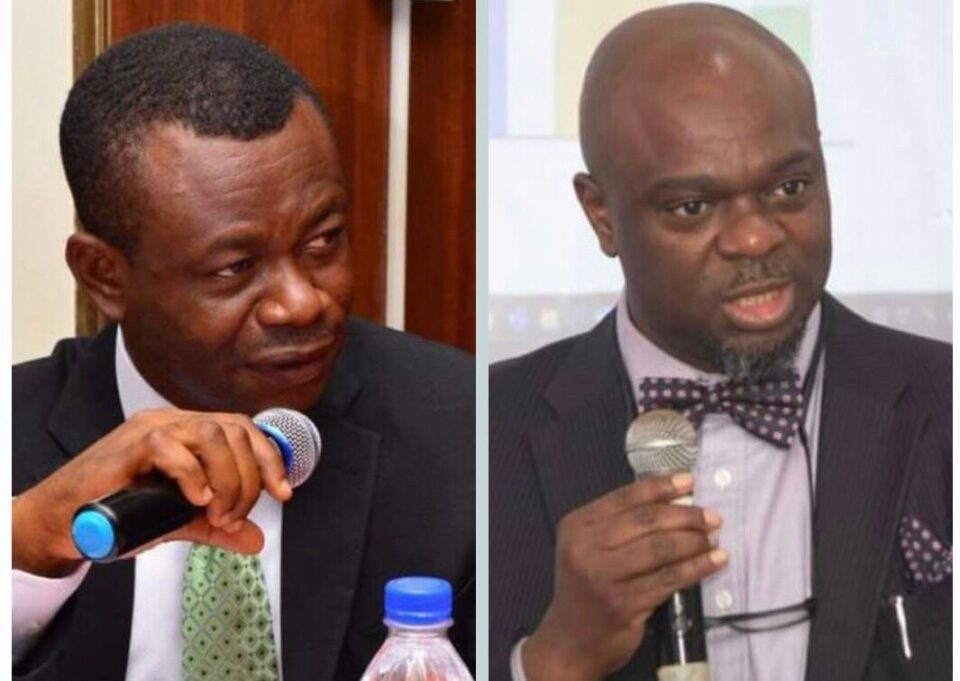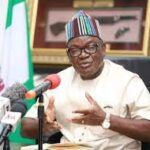By Ben Nwosu & Ndu Nwokolo
“Nigeria’s electoral umpire has become a veritable soft target for criminals and political buccaneers.” — NEXTIER scholars
General elections in Nigeria will take place on February 2023, which is seven months away. There are spirited preparations and growing expectations among political interests in the country. There is also the election management side of the preparation, such as the logistics of elections, manpower needs, voter registration and more. The institutional competence of the election management body is crucial for the success of any election, especially in ensuring its transparency and accountability. In addition, a peaceful atmosphere is necessary for free and fair ballots. However, the build-up to the 2023 presidential election tends to be accompanied by increasing anxiety and tensions occasioned by attacks on the election management body, the Independent National Electoral Commission (INEC).
Attacks on INEC became quite noticeable in the run-up to the 2019 elections. On May 27, 2021, it was reported that INEC witnessed 41 attacks in the last two years. Between April and May 2021, INEC facilities were either burnt or vandalised in attacks that happened in 14 different states of Nigeria.
Apart from coordinated attacks on different INEC facilities between 2019 and 2021, there is a resurgence of attacks on the same electoral institution in the South East region. There was an arson incident at an INEC office in Igboeze North Local Government Area of Enugu State on July 3 2022. This led to the suspension of voter registration exercises in the affected local government. The suspension in question is problematic as many people struggling to register for participation in the 2023 ballots are likely to be disenfranchised for not having the opportunity to register. Beyond disenfranchisement, the attacks on INEC facilities have further unsettling implications for the approaching 2023 general elections. In this edition of Nextier SPD Policy Weekly, we examine the potential impact of the renewed attacks on INEC facilities on the forthcoming presidential elections.
ATTACKS BY WHOM AND WHAT EFFECT?
A Premium Times log reveals that the attacks on INEC facilities in the last two years had taken place in 14 states, including Abia, Anambra, Akwa Ibom, Bayelsa, Borno, Cross-River, Ebonyi, Enugu, Imo, Ondo, Osun, Lagos and Taraba and Kaduna States. (See ) Out of the 41 incidents reported in this log, there were nine incidents in 2019: 21 occurred in 2020, and 11 happened in 2021. The July 3rd 2022, attack at the INEC office in Igboeze LGA made it the 42nd violent incident on the electoral institution.
Data from the Premium Times log shows that recurrent attacks on INEC facilities are significantly a Southern Nigeria problem. For instance, within Premium Times’ tracking period, all five states in southeast Nigeria have recorded attacks on INEC facilities. While half of the states in the Southwest zone have recorded similar attacks, only one state made it to the list for the Northwest and then two states in the Northeast. According to the Premium Times, no state in Northcentral Nigeria has reported an attack on INEC facilities within the two-year tracking window. Arguably, attacks on INEC facilities are significant in areas with targeted onslaughts against government institutions. For instance, in recent years, security agencies often indicted the proscribed Indigenous People of Biafra (IPOB) for attacks in the Southeast zone. Furthermore, despite the recurrent banditry in the Northwest and twelve years of insurgency in the Northeast, direct attacks on INEC facilities are significantly low compared to the relatively less violent southern Nigeria. Premium Times’ data is a pointer to the targets of violent interests and attacks in Nigeria’s violent conflict hotspots.
The categories and sources of the attacks include Boko Haram insurgency, armed banditry, post-election violence, thuggery during elections, unknown gunmen, and the “End SARS” protest. The latest attack would likely be under the category of unknown gunmen. In the view of an analyst, likely, bandits and unknown gunmen who have been in hot pursuit from Anambra State in recent times may have relocated to Enugu State to continue their activities (Personal communication, 2022). Thus, targeted attacks on INEC are one of the symptoms of general security crises across the country. As the 2023 elections draw nearer, there is a likelihood that such attacks may increase in number and intensity. It is more worrisome that security measures taken to protect INEC, if any, are neither significant nor effective. INEC offices in Enugu State, for instance, had been attacked twice prior to the last attack. Such earlier experience should have warranted better preparation against future incidents. But the recent arson was seamless. So far, there are no reports of the arrest of the culprits. In effect, the state responds to affronts to its authority from a weak position.
The seamlessness with which the attackers of INEC accomplish their criminal activities suggests that as the 2023 elections approach, the tempo of such offensives will increase. The consequence would generally be wide-ranging for the electoral cycle, and we consider a few vital ones.
The first important effect of the arson attacks on INEC facilities is the suspension of continuous voter registration in Enugu State. This would further translate to the disenfranchisement of throngs of qualified and willing voters in the state who have been making efforts to be enlisted in the voters’ register so they could participate in the forthcoming elections. If this group of citizens were not supported to exercise their civic voting right, the criminals behind the activities would have achieved a major victory in undermining the credibility of the elections. The disenfranchisement of willing voters is a pre-election category of vote-rigging or even disruption.
The second possible effect of the arson attacks is the creation of a climate of fear and danger as the election approaches. Destruction of an electoral umpire’s infrastructure and operational logistics suggests a rejection of their responsibility to the government and citizens. Persistent successful attacks on the electoral body are likely to be a source of fear to voters. Already, there are cases of attacks and disruption of voter registration. In one instance in Imo State, an INEC staff was shot and killed, also leading to a suspension of voter registration in the area. The cumulative effect of a climate of violence around Nigeria’s election management body is that those who successfully registered for the ballot are unlikely to participate due to well-founded fears of possible physical attacks during the elections.
Thirdly, the destruction of the infrastructure and logistics of the electoral umpire raises Nigeria’s cost of the election, which is already high, to a further unreasonable level. At the moment, INEC’s annual budget is ₦40 billion. Besides this annual budget, the electoral body has submitted a budget of ₦305 billion for the conduct of the 2023 general elections to the National Assembly. This amount is exclusive of the ₦40 billion annual budget.
Furthermore, as the astronomical budget did not anticipate losses to targeted attacks, funds would be needed to replace items lost to the arson. For instance, during the July 3, 2022, attack in Enugu State, several working materials were lost, and INEC’s astronomical election budget did not anticipate these losses.
Nigeria’s electoral umpire has become a veritable soft target for criminals and political buccaneers. This is an outcome of cavalier management of security around the institution. As attacks continue to target the body with rudimentary or unrealistic responses, it leaves an unspoken message that the state cannot assert its will. Apart from the present attacks, those desperate to win elections may, out of their conviction that a free and fair election may not yield victory for them, resort to further attacks on INEC to create chaos. As a result, strategies must be considered for mitigating the different forms of attack on the electoral body.
SUGGESTED REMEDIES
INEC should reorganise security around its facilities and consider the increasing use of technology to secure its structures and equipment. For example, some investments in CCTV cameras may be useful for monitoring who does what around their offices.
Security reorganisation in their places of operation requires better coordination with security institutions. A 24-hour rapid response from security institutions should be arranged for INEC so that any emergency or attack is arrested early enough.
To neutralise the effects of the attacks on INEC, especially the recent ones, the government should support the security agencies to find out, arrest and punish the culprits behind the attacks and restore confidence in the citizens.
One symbolic way the government can assert its sovereign power is by restoring voter registration in the affected states to retain confidence in the government and its institutions.
POLICY RECOMMENDATIONS
1. INEC should reorganise security around its facilities and consider the increasing use of technology to secure its structures and equipment.
2. Security reorganisation in their operational bases requires better coordination with security institutions.
3. The government should support the security agencies to find, arrest and punish the culprits behind the attacks and restore confidence in the citizens.
4. Government should restore voter registration in the affected states to retain a modicum of confidence in the government and its institutions.
CONCLUSION
Persisting successful attacks on Nigeria’s electoral umpire is a fundamental state weakness. It means that basic civic participation cannot be guaranteed. In that case, as the attacks continue, electoral anxiety soars, and not many persons may be willing to exercise their rights of participation in the coming 2023 general election. Ultimately, such an outcome suggests that an indirect rigging of the votes would have occurred because the voters were scared off in advance without commensurate pushback from the state. Therefore, at the very core, the government should help INEC to reorganise its security, reopen voter registration and other preparations for a credible ballot.
* Dr. Ben Nwosu is an Associate Consultant at Nextier SPD; and Dr. Ndu Nwokolo is a Managing Partner and Chief Executive at Nextier SPD)



